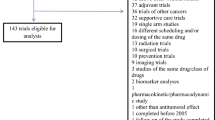Summary
Regorafenib (Stivarga) is an oral small-molecule multikinase inhibitor commonly used against a variety of cancers. We performed a meta-analysis of all phase 3 randomized controlled trials (RCTs) of regorafenib to quantify the increased risk of SAEs and FAEs. We carried out a systematic search of electronic databases for studies published from inception to February 2017 without any restrictions. Eligibility criteria included phase 3 RCTs of tumors comparing regorafenib, alone or in combination with non-targeted chemotherapy (regorafenib arm) versus placebo or non-targeted chemotherapy (control arm). Data on SAEs and FAEs were extracted from each study and pooled to determine the overall incidence, relative risks (RRs) and 95% confidence intervals (CIs). A total of four phase 3 RCTs involving 1736 cancer patients met the eligibility criteria and were included. The overall incidence of SAEs and FAEs with regorafenib were 0.23 (95%CI, 0.05–0.40) and 0.02 (95%CI, 0.01–0.03), respectively. Compared with control, the summary RR of developing a regorafenib-related SAE was 1.60 (95%CI, 0.95–2.68, P=0.07), the summary RR of developing a regorafenib-related FAE was 1.71 (95%CI, 0.69–4.24, P=0.25). No evidence was found for the association between regorafenib and higher risk of SAEs and FAEs. This association varied significantly with cancer types (P=0.02) for SAEs but no evidence of heterogeneity was found for FAEs. This meta-analysis demonstrates no evidence for the association between regorafenib and higher risk of SAEs and FAEs. This analysis will be important when considering the trade-off of regorafenib treatment during clinical decision-making.



Similar content being viewed by others
References
Saravanan K, Krishnamoorthy VR, Sebastian S et al (2015) Management of regorafenib-related toxicities: a review. Ther Adv Gastroenterol 8(5):285–297
Festino L, Fabozzi A, Manzo A et al (2013) Critical appraisal of the use of regorafenib in the management of colorectal cancer. Cancer Management and Research 5:49–55
De Wit M, Boers-Doets CB, Saettini A et al (2014) Prevention and management of adverse events related to regorafenib. Support Care Cancer 22:837–846
Jadad AR, Moore RA, Carroll D et al (1996) Assessing the quality of reports of randomized clinical trials: is blinding necessary? Control Clin Trials 17(1):1–12
Grothey A, Van Cutsem E, Sobrero A et al (2013) Regorafenib monotherapy for previously treated metastatic colorectal cancer (CORRECT): an international, multicentre, randomised, placebo-controlled, phase 3 trial. Lancet 381:303–312
George D, Demetri PR, Kang Y-K et al (2013) Efficacy and safety of regorafenib for advanced gastrointestinal stromal tumours after failure of imatinib and sunitinib: an international, multicentre, prospective, randomised, placebocontrolled phase 3 trial (GRID). Lancet 381(9863):295–302
Li J, Qin S, Xu R et al (2015) Regorafenib plus best supportive care versus placebo plus best supportive care in Asian patients with previously treated metastatic colorectal cancer (CONCUR): a randomised, double-blind, placebo-controlled, phase 3 trial. Lancet Oncol 16:619–629
Bruix J, Qin S, Merle P et al (2017) Regorafenib for patients with hepatocellular carcinoma who progressed on sorafenib treatment (RESORCE): a randomised, double-blind, placebo-controlled, phase 3 trial. Lancet 389:56–66
Yue-hong C, Liang D, Xing-yuan G et al (2014) Implement meta-analysis with non-comparative binary data in RevMan software. Chin J Evid-based Med 14(7):889–896
Acknowledgments
We thank Dominic James, PhD, from Liwen Bianji, Edanz Editing China (www.liwenbianji.cn/ac), for editing the English text of a draft of this manuscript.
Funding
The project is sponsored by the scientific research foundation for the introduction of talents, Liaoning Cancer Hospital & Institute. Educational Commission of Liaoning Province of China (No. 20060973), the Science and Technology Planning Project of Liaoning Province of China (No. 2007225009-1, 2011404013-9, 2011225019, 2013225079), the National Natural Science Foundation of China (No. 81372532), the Science and Technology Planning Project of Shenyang (No. F15-139-9-27).
Author information
Authors and Affiliations
Corresponding author
Ethics declarations
Conflict of interest
Meihui Cao declares that she has no conflict of interest. Feifei Li declares that she has no conflict of interest. Yue Wang declares that he has no conflict of interest. Jingdong Zhang declares that he has no conflict of interest.
Ethical approval
This article does not contain any studies with human participants or animals performed by any of the authors.
Rights and permissions
About this article
Cite this article
Cao, M., Li, F., Wang, Y. et al. Treatment-related serious adverse events and fatal adverse events with regorafenib in cancer patients: a meta-analysis of phase 3 randomized controlled trials. Invest New Drugs 35, 834–838 (2017). https://doi.org/10.1007/s10637-017-0512-6
Received:
Accepted:
Published:
Issue Date:
DOI: https://doi.org/10.1007/s10637-017-0512-6




